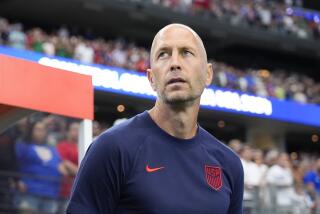Steinbrenner’s Status Is on USOC’s Agenda
- Share via
COLORADO SPRINGS, Colo. — The George Steinbrenner problem, which baseball apparently disposed of this week when he resigned as the New York Yankees’ general partner, has become sole property of the U.S. Olympic Committee.
If the USOC’s eventual solution seems less decisive than the one arrived at by Fay Vincent, commissioner of baseball, perhaps it is because the Steinbrenner each knows is so different.
Vincent ruled that Steinbrenner acted contrary to the best interests of baseball, but no one can make that charge about his work as a USOC member since 1985. Even those who want him to resign as a vice president 18 months into his four-year term acknowledge that their primary concern is the potential for embarrassment.
Is that reason enough to ask him to quit?
That is the question confronting the USOC’s 23-member executive committee as it gathers today and Thursday in Colorado Springs for its first meeting since Steinbrenner was banned by baseball because of his dealings with admitted gambler Howard Spira.
Steinbrenner is scheduled to attend, although he will be asked to leave the room when his role with the USOC is discussed.
When Steinbrenner returns to the room, the executive committee probably will make a recommendation--which he will be free to ignore. Even if the executive committee was in the mood to impeach Steinbrenner, which it apparently is not, it does not have the authority. That belongs to the 121-member board of directors, which will meet Oct. 20-21 in Raleigh-Durham, N.C.
USOC President Robert Helmick said he does not expect the situation to reach that point. But many executive committee members did not expect it to reach this point.
Several said they hoped the potentially divisive issue would have been resolved before the executive committee meeting, which will be attended by Juan Antonio Samaranch, president of the International Olympic Committee.
Helmick said he has discussed several options with Steinbrenner but added that Steinbrenner wants to hear views from other executive committee members before deciding.
Asked to predict what Steinbrenner will hear, Helmick said: “From my discussions with executive committee members, I think the feeling is that George should indeed continue to make a contribution to the USOC. But there is also an interest in ensuring that his presence as a vice president doesn’t interfere with our business.”
Christopher Wood, an executive committee member from Seattle, said he believesSteinbrenner’s options are:
--Making a clean break by resigning.
--Resigning as an officer but becoming a non-voting member of the executive committee.
--Stepping down indefinitely. That would give the USOC time to determine whether he can remain effective.
--Continuing as if nothing has happened.
Least likely, and also least desired by most executive committee members, is an outright resignation.
Steinbrenner has said that he would resign only if convinced it would be in the best interests of the USOC. Instead of accepting Vincent’s initial sentence of a two-year suspension, Steinbrenner told Barbara Walters of ABC’s “20/20” last week that he volunteered to relinquish control of the Yankees for the rest of his life because he believed that would have less impact on his role with the USOC.
“There was no ban, no probation, no suspension,” he said. “I couldn’t accept that and continue to do the thing that is the most important to me right now, and that is the U.S. Olympic Committee. I’m so wrapped up in the U.S. Olympic movement, I wanted so badly to continue.”
At times, Steinbrenner has displayed the same bluster that was so evident in his 18 years as general partner of the Yankees. At a meeting in Washington before he became an officer, upon learning of a USOC grant to the Japanese, Steinbrenner slammed his hand on a table and, loud enough for most in the room to hear, said, “That . . . has got to stop.”
Since becoming one of three vice presidents, he has has been outspoken in demanding a larger percentage of television rights fees from the IOC, a touchy issue internationally.
But those occasions have been rare. Steinbrenner was criticized because the overview commission he was selected to head in February of 1988 released a report 12 months later that said the USOC’s primary objective was to win medals. But the controversy obscured the structural and financial plan offered by the commission that, according to Helmick, has made the USOC considerably better organized and more efficient.
The Steinbrenner known by most USOC members listens as eagerly as he talks, introduces them to influential members of the business community and politicians, is free with his time, energy and money and occasionally interrupts tedious fall Saturday afternoon meetings by grabbing the microphone from Helmick and reading college football scores.
But now that his name is turning up in reports using words such as gambling and extortion, it is a different ballgame.
Helmick said: “We have to be fair to George, but we also have to be insulated from all that.”
Although Steinbrenner has not been accused of doing anything illegal, some executive committee members are concerned that he has been tainted. Fearing the impact that could have on the USOC’s relationship with corporate sponsors and the public, they have been attempting to find out which way the wind is blowing.
They have discovered hardly a breeze. Only two letters have been received at USOC headquarters. One newspaper columnist has expressed his opinion. Outside of New York, fund-raisers report no decrease in contributions because of Steinbrenner.
“Everyone is waiting for us to make a decision,” Helmick said. “I think they have confidence that we’ll do the right thing.”
More to Read
Go beyond the scoreboard
Get the latest on L.A.'s teams in the daily Sports Report newsletter.
You may occasionally receive promotional content from the Los Angeles Times.






